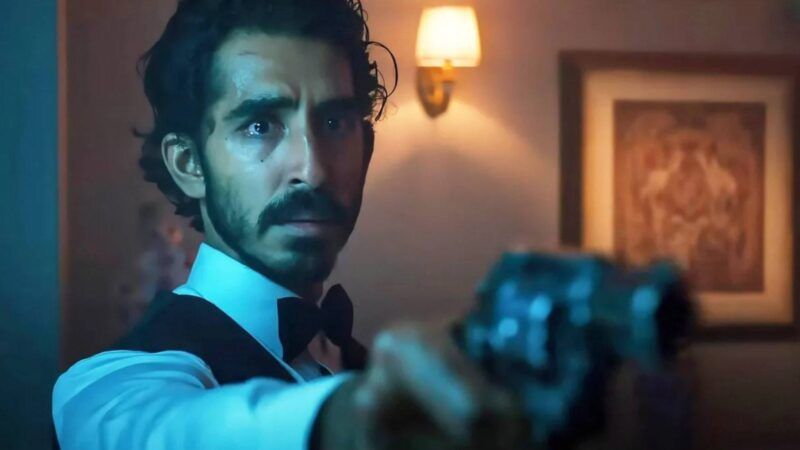Monkey Man Is No John Wick. But It's Invigorating, Politically Potent Action Cinema.
Dev Patel's action debut is a righteous, wild revenge film.

If you were hoping Monkey Man would be the next John Wick, well, star, co-writer, and director Dev Patel knows. And the movie makes it amusingly clear that he knows what you were hoping for.
Early in the movie, his character, an unnamed young man who earns money fighting in underground bare-knuckle matches, walks into a sketchy gun dealer's shop. The dealer offers him the newest weapon in the story: a Chinese knockoff, he explains, of the gun used by Wick. Instead, Patel's character chooses something smaller, older, grimier, and less elegant—a revolver small enough to fit in his pocket, good for close-up work.
That's Patel's movie: Smaller, dirtier, less elegant, more of a close-up affair than the slickly choreographed, high-concept action seen in the Wick films. But what it loses in action savvy it mostly makes up for in raw feeling and political savvy. It's a bare-knuckle swing against Prime Minister Narendra Modi's India and the way it treats the underclass.
Patel's character is a nobody living in a world of nobodies. He roams the dirty, overcrowded streets of his city, unnoticed by the city's moneyed overclass. By night, he fights in front of cheering, jeering crowds. He's a skinny, shredded figure in an eerie monkey mask, and his work is to absorb pain: In order to make the most money, the fight promoter insists that he bleed.
But Monkey Man is on a mission that only slowly becomes clear: He has revenge on his mind. So he takes a dishwashing job at a local club frequented by politicians and power players. After ingratiating himself with one of the club's operators, he gains access to the VIP room—and he brings his gun. His target is a corrupt police official, but his assassination attempt fails, leading to a sprawling, chaotic, multi-part action sequence in which Patel, as both director and actor, shows off what he can do with a limited budget and his own body.
Part of the fun of this early sequence is that Patel's Monkey Man isn't a bulked-up, hardened action hero. If anything, he's in way over his head, driven mad by a desire for revenge that viewers still only barely understand. So when he tries to make a flying leap through a hallway window, he just bounces off. Back to the bare-knuckling.
After this rousing sequence, the movie takes a turn: Monkey Man escapes, finding respite with an outcast clan of transgender folks who nurse him back to fighting form. You've seen this death-and-rebirth arc before—it's at least as old as Rocky—but this is where the movie struggles most.
This middle section is heavy on trippy flashbacks, as we learn that Monkey Man's revenge plot is driven by a politicized land grab during which a fake yogi guru seized land for a luxurious temple with the help of government authorities.
It's clearly a nod to similar real-life conflicts in Modi's India, which has become more overtly religious and less secular. There's a righteous political anger on display, to the point where rumors suggested that Netflix, which originally produced the film, was worried it might offend the powers that be in India. But it's also a long, vibes-heavy section in which essentially nothing happens as the movie backs up to finally explain why the story is happening at all.
Viewers don't need to be up on the latest in Indian political affairs to understand what's going on: Indeed, the movie plays better as a more generic story about class warfare, with Monkey Man acting as an avenging angel for the overlooked poor. More striking than the movie's religious-political overtones is the way that it shows the difficult circumstances of people living in and on the streets, the way it not only captures the overstuffed density of urban slums but uses those images to hammer home the injustices Monkey Man is trying to rectify.
Is it a great movie? Not quite. But it's a strong debut from a talented, enthusiastic action filmmaker who has something to say.


Show Comments (9)